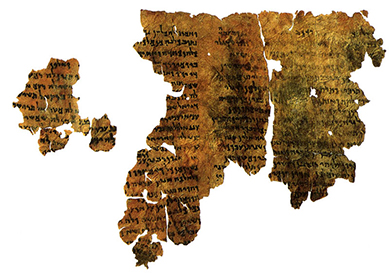Though one of the shortest letters in the New Testament, Jude’s epistle provides a most fascinating conundrum for those seeing a clear difference between what counts as the Bible and what does not. It quotes approvingly from apocryphal (nonbiblical) writings, including a lost Jewish text (the Assumption of Moses) and 1 Enoch (
Jude 1:14-15), the latter of which was considered Scripture by some Jewish communities (e.g., the community of Qumran who wrote the Dead Sea Scrolls had multiple copies of 1 Enoch signifying its high esteem within the community). Even though Jude was written before the question of the canon, either Old Testament or New Testament, had ever been raised by anyone, this did not stop some Christians from being suspicious of Jude because of its reference to apocryphal writings. Adding to these suspicions, Jude’s harsh and judgmental language and lack of compassion for opponents presents no hope for their salvation (e.g.,
Jude 1:12b: “They are waterless clouds blown about by winds, fruitless trees in late autumn, twice dead and uprooted,” etc.); because of this, preachers and scholars have historically avoided the letter. Yet, whatever its theological implications, Jude provides an interesting glimpse into early Jewish and Christian uses of noncanonical texts.
How did Jude use Apocryphal texts?
Jude refers to apocryphal texts in passing, with little introduction. For instance, in
Jude 1:9, the letter condemns the author’s opponents for their arrogance and haughtiness and claims that they fail to grasp that humility always characterizes God’s servants. Even the highest of God’s servants, the chief angel Michael, embodies humility, the letter says: “But when the archangel Michael contended with the devil and disputed about the body of Moses, he did not dare to bring a condemnation of slander against him, but said, ‘The Lord rebuke you!’” (Jude 1:9). This version of Moses’s death is not found in the biblical story found in
Deut 34:1-12. Rather, Moses’s death in Deut 34 is described as ordained by God (
Deut 34:5) and his burial location hidden (
Deut 34:6). Yet Jude’s assumes that his readers are fully aware of a broader tradition, whether written or oral, in which a struggle occurs over Moses’s body between Satan and God’s chief angel, Michael (cf.
Dan 12:1). He seems to have no issues with referring to such tradition as if it is Scripture.
How did Jude use 1 Enoch?
Jude’s reference to the apocryphal 1 Enoch in
Jude 1:14-15 suggests that what counts as Scripture to the author of this text differs from modern canons in both Judaism and Christianity. Without a single, standardized canon at the time, different Jewish groups adopted different texts as Scripture. The presence of multiple copies of 1 Enoch among writings of the Qumran community suggests that it was recognized as Scripture in the community. Considering that Jude and some members of his community were possibly Jewish converts to Christianity, the letter’s reference to 1 Enoch may suggest that Jude accepted the text as Scripture, just like the community at Qumran did. Such a possibility is also supported by the fact that Jude’s caustic language reflects entrenched differences with opponents that mirror sectarian language found in the Qumran community.
Another possible explanation for Jude’s use of nonbiblical texts is that Jude uses apocryphal writings as a polemical strategy. We see this elsewhere in the New Testament (e.g., Jesus vs. Sadducees in
Matt 22:23-33;
Titus 1:12; etc.), where quotes are made from texts that only opponents consider authoritative in order to debunk the opponents’ arguments. In such a case, the texts would have been quoted not in recognition of their authority but as a tool against opponents.
In conclusion, Jude’s use of apocryphal sources either reflects a larger diversity among Jewish communities on what was considered Scripture than modern readers are accustomed to or demonstrates the use of apocryphal sources as strategic rhetoric to defuse claims by opponents.
Bibliography
- Green, Gene Jude and 2 Peter. ECNT: Grand Rapids, MI: Baker, 2008.
- Bauckham, Richard J. Jude, 2 Peter, Word Biblical Commentary; Waco, TX: World Books, 1983.
- Davids, Peter The Letters of 2 Peter and Jude. PNTC: Grand Rapids, MI; Cambridge, UK: Eerdmans & Apollos, 2006.





